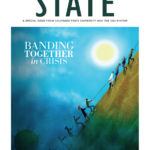For the past two years, our leadership team at Colorado State University Pueblo has been focused on innovation and the future – so when the pandemic hit, we were uniquely positioned to respond. Our long-term strategic plan prepared us to create a smart, nimble response to a world we didn’t imagine when we unveiled the Vision 2028 blueprint in 2018.
From the beginning of the pandemic crisis, I articulated four priorities for any future decision (in this order): (1) Ensure our mission of teaching and learning; (2) Keep employees safe and full-time employees employed; (3) Create business continuity moving forward as we keep the campus running; (4) Provide financial sustainability.
Upholding these priorities has required we adapt quickly to meet the particular needs of our students. The university’s IT team worked tirelessly to load 150 laptop Chromebook computers with the software our students needed. CSU Pueblo purchased 100 Internet regional “hot spots.” Funding came through U.S. Department of Education Title III and V grants of $15.4 million, awards designated for Hispanic-Serving Institutions. Eighty more computers came from Colorado’s Department of Higher Education.
Those computers and hot spots are a lifeline for many CSU Pueblo students. Erika Ayala Hodges is one. She and husband, Carter, are both Air Force veterans; they chose Pueblo as their new home when they left their posts in North Carolina. They drove a 25-foot RV to arrive at Pueblo’s KOA Campground in January. They were just beginning to do the expected (enroll, find a place to rent, get a job) when the pandemic hit. They and their 1-year-old daughter, Isabella Rose, are now struggling through the temporary hold in their lives.
CSU Pueblo knows its students, and the keys to successful online learning were equipment and access. Erika is using a university laptop and hot spot. If we hadn’t been able to respond to Erika’s need, she would have lost her GI benefits and her chance at achieving her educational goals.
When we moved to close campus in March, we knew effective communication was critical to success. We have used multiple platforms to stay in touch with students and faculty as they transitioned online, and the campus website has been essential to keeping us informed. Our website Campus Safety: Coronavirus provides multiple resources, including weekly updates on professional development opportunities, dates and times for virtual “open office hours” to all employees, and information about fun online events and employee recognitions.
Electronic connection has become our lifeline to each other and to moving forward, even with current constraints. Faculty and students alike have had to be flexible in responding to remote learning.
Fortunately, some faculty are technology champions and gifted at creating a successful learning experience for students online. Associate Professor Alegria Ribadeneira is an outstanding example of teaching and service. When the university closed in-person classes, she knew her World Languages Program could not recognize its graduating seniors in the traditional way. They were left in a celebratory lurch. So she created an interactive flip e-book allowing students to tell their stories, say thanks, and post photos. Faculty recorded greetings, and Dr. Ribadeneira recorded a personal message for each graduate, ending with applause. Students can celebrate with friends and family now until December’s on-campus ceremonies.
In this challenging environment, we especially call upon the skills of experts such as instructional technologist Denise Henry. She helps faculty create effective communication and teaching online, whether they are synchronous (everyone meets at the same time) or asynchronous (self-guided learning). She’s always focused on the student experience, which is enhanced through such techniques as adding reflection points, interactive tools, and formal assessment in a format that supports students needing ADA accommodation.
Everyone can learn to use technology regardless of their age and experience. CSU Pueblo makes sure all our faculty have the support they need to succeed as teachers in the online setting. They may not consider themselves digital natives, but they’re working hard and trying.
And that’s been one of the big lessons for our entire campus during this unprecedented challenge: It’s good for everyone to keep learning – and planning and a spirit of innovation are the antidote to crisis.
Timothy Mottet, Ed.D., is president of Colorado State University Pueblo, a regional comprehensive university federally designated as a Hispanic-Serving Institution. As a recent Baldrige Executive Fellow, he undertook leadership development through a top-ranked program of the U.S. Department of Commerce.





